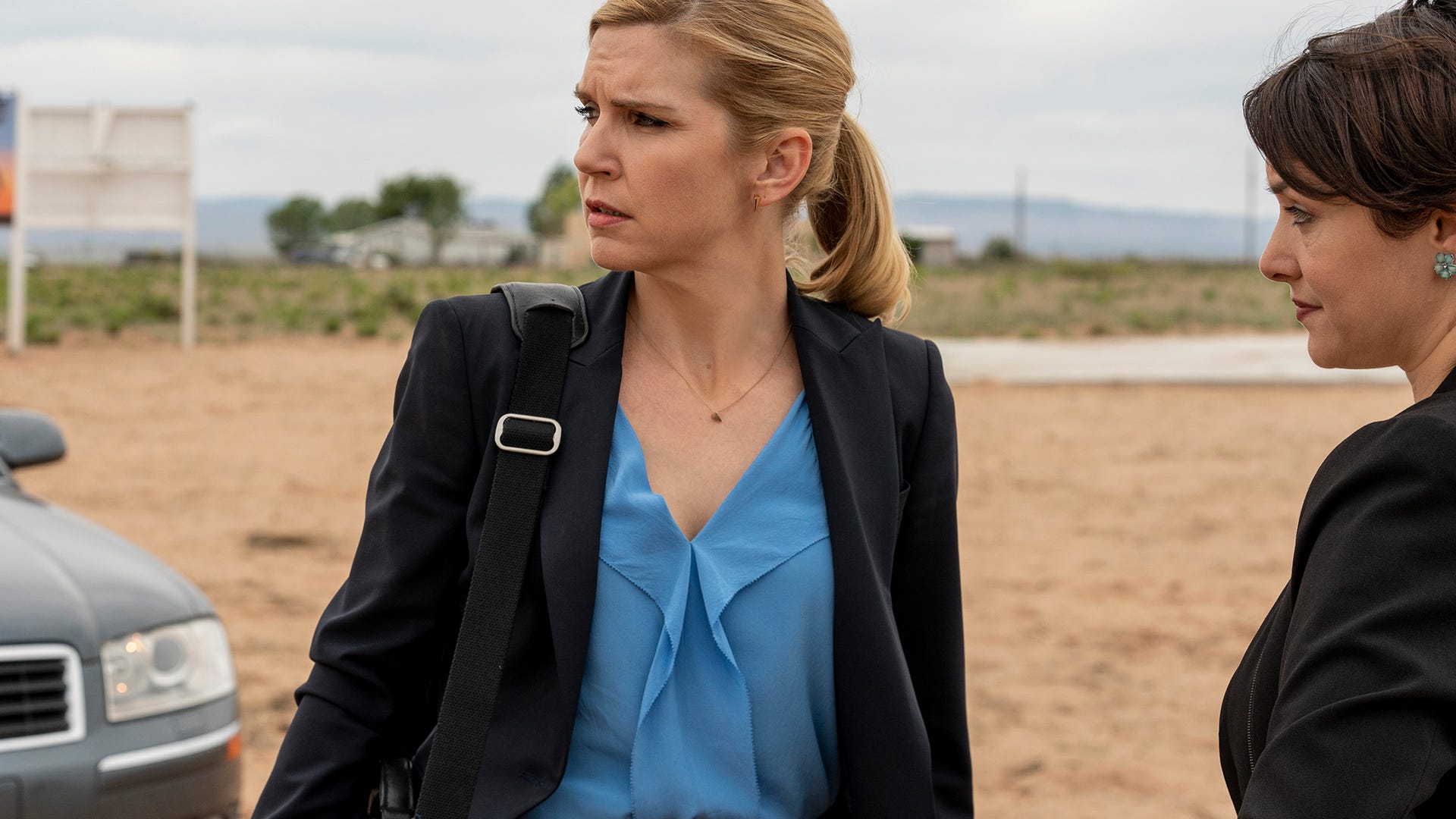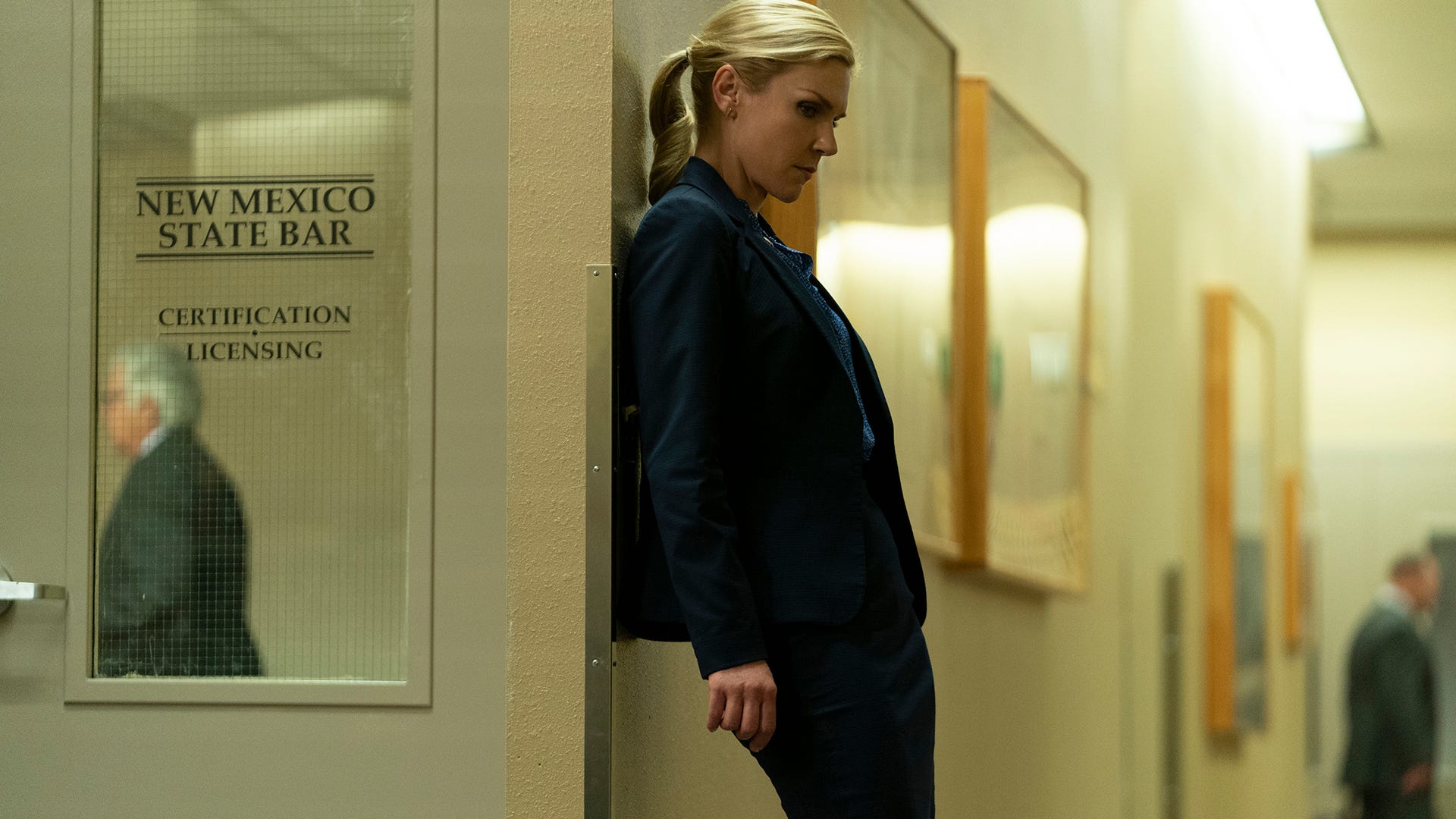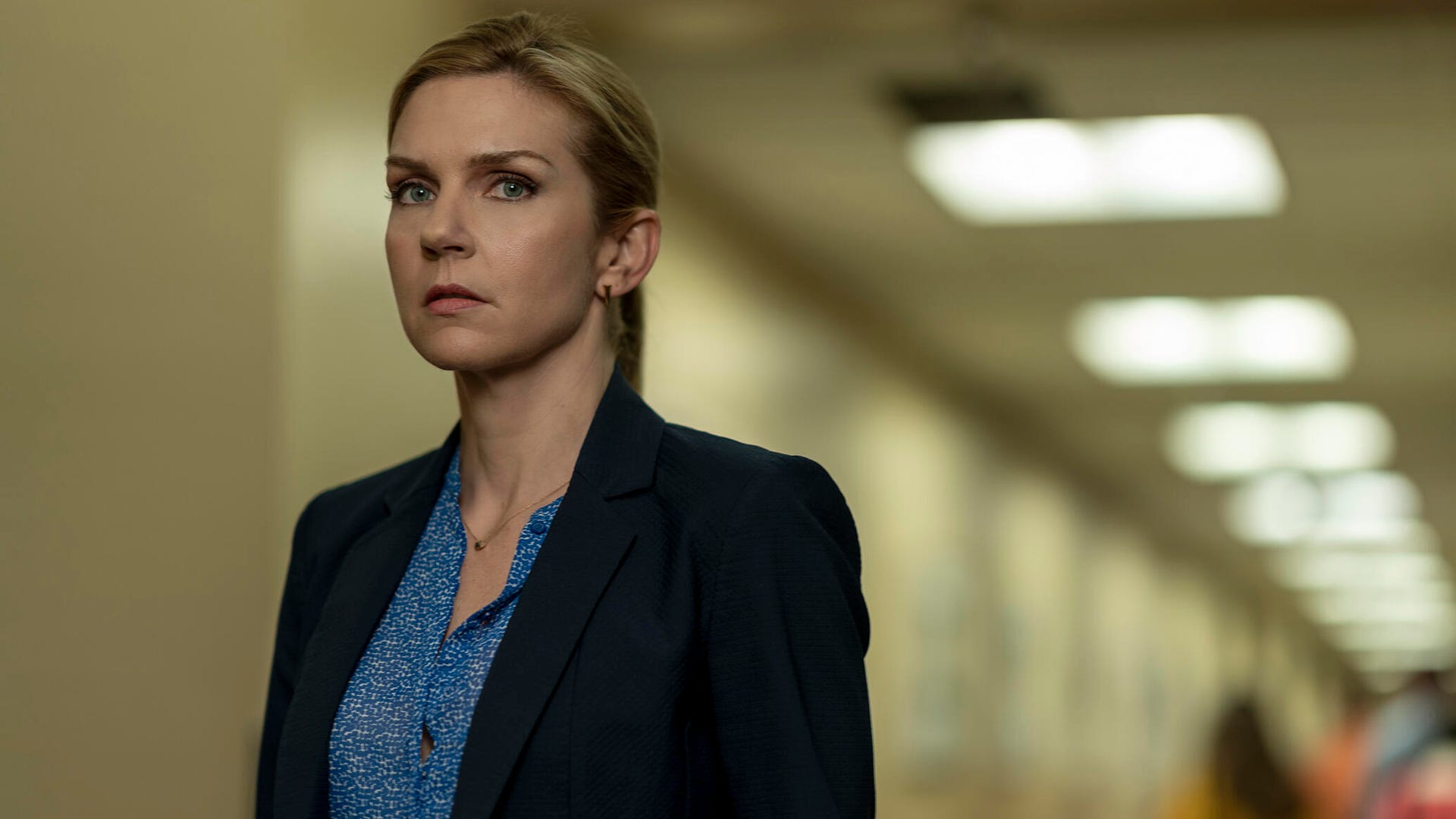Join or Sign In
Sign in to customize your TV listings
By joining TV Guide, you agree to our Terms of Use and acknowledge the data practices in our Privacy Policy.
Better Call Saul's Kim Wexler Is the Best Character on TV
Kim exposes how hard it is to be good
[Warning: The following contains spoilers for Monday's episode of Better Call Saul, "The Guy for This." Read at your own risk!]
There's a shot in Monday's episode of Better Call Saul that's stuck with me. Kim Wexler (Rhea Seehorn) is celebrating. She's having a drink on her apartment balcony, savoring the fact that all of her clients the next day are pro bono. Jimmy (Bob Odenkirk) takes her empty beer bottle and sets it on the railing, and Kim stretches, leaning forward until she's eye level with the bottle. She looks like she's daring it to fall off the ledge. The shot draws a line from one to the other: Kim and that bottle, both precariously balanced.
Kim Wexler has been Better Call Saul's best character for years now: the driven lawyer whose loyalty to Jimmy gives her an outlet for her rebellious side, even as she suffers for it. But at some point in the third episode of Season 5 -- probably when she snapped in the face of a man she had to kick out of his own house -- I realized I don't know a better character on TV in general, and that's because there's a chance I don't know Kim Wexler at all.
Better Call Saul Brought Back a Breaking Bad Favorite and It Was the Best
Kim's story in Monday's episode of the AMC drama centers on her work for Mesa Verde, the bank that "keeps the lights on" for her even as it's grown into the sort of big bad financial institution she can't work for without selling out. Kim is called away from her pro bono clients in order to play dirty out in Tucumcari, a small town in the desert where Mesa Verde has decided to open a call center on what used to be residential property. One man, a Mr. Acker (Barry Corbin), refuses to move, even though the bank has legal claim to his land. This is Kim's job now -- kicking an old man out of his house.
Like most characters on Better Call Saul, Mesa Verde wasn't always this bad. The bank has been a professional obstacle for Kim before, but that storyline had more to do with her idealism than with anything morally objectionable about the job itself. She just realized she wasn't doing what she wanted to be doing. Kim's arc in Season 4 was a strikingly real example of how most people handle falling out of love with their work: She carried on. She figured helping a bank take over the Southwest was the grave she'd dug for herself. Even when she eventually found a solution that seemed almost perfect -- delegating the Mesa Verde grunt work to her new team at Schweikart and Cokely -- it was clear the deal was too good to be the end of the story. No show is better than Better Call Saul at piling one consequence on top of another, so incrementally that they become inescapable.

Rhea Seehorn, Better Call Saul
Greg Lewis/AMC/Sony Pictures Television
So Kim does her job. She starts out staying on script, hollowly reciting all the talking points about how "inconvenient" it must be for Acker to be kicked off his land. But Acker, a delightfully obstinate foil, pushes back. Acker accuses Kim of being just the same as all the other "soulless money grubbers" Mesa Verde has sent to his front door, even if she looks less threatening. "You're the big gun," he needles. "With a ponytail!" The minute Acker questions her morality, Kim snaps, crossing the threshold of his property and getting in his face. "You do not get to make up your own rules," she tells him. It sounds at first like she's leveling with Acker, respecting him with her candor, but her anger seeps through. "Do you think you're special?" Kim raises her voice. "A contract means something. It's the law, and it's enforceable. Deal with it."
Discover your new favorite show: Watch This Now!
It's an exquisite confrontation, one that forced me to reconcile my instinctual support for Kim -- how cruel of the bank to make her do this! How dare Acker lump her in with them! -- with something a little more unsettling. How rich for her to argue that no one gets to make up their own rules! She might as well be yelling at herself. Kim has been especially rattled lately by how easily she gives in to Jimmy's cons; she didn't appreciate being reminded, in last week's season premiere, that scamming her clients "worked for Mesa Verde," because scamming her clients is not something Kim Wexler should do. But then she did it again. She keeps moving the line until even her public defense work, her sanctuary, is fair game for a con.
Acker pricks Kim's nerves by preying on her fear that none of her good deeds will be enough to cancel out the bad she's done, in part because she keeps doing more bad things. Every compromise she makes, no matter how justified, leads to another. When she lies to her pro bono client so he doesn't have to spend more time in jail, she's betraying her obligations as his lawyer; when she follows the letter of the law, she winds up having to force an old man out of his house. Maybe there's no way to win -- she's damned if she does play by the rules and damned if she doesn't -- but her choices still matter. She wouldn't go back to Acker's place if they didn't.

Rhea Seehorn and Bob Odenkirk, Better Call Saul
Warrick Page/AMC/Sony Pictures Television
Kim shows up at Acker's door that night when the bank is long gone, armed with listings for homes the old man might like. She can take off any day this week to help with his move, she says; she'll pay for it out of her own pocket. Seehorn plays Kim with painful vulnerability here; she's practically begging Acker to recognize who she is outside Mesa Verde and to like her for it. When Acker refuses to accept her penance, Kim offers up a story from her childhood: She remembers all the times her mother shook her awake in the middle of the night to run from landlords, packing everything she owned into a cardboard box. "If we'd had a house I never would have wanted to leave," she says. Acker isn't moved. Before he slams the door in her face, he gets in one final jab: "You'll say anything to get what you want, won't you?"
The gut punch there isn't just that Acker doesn't absolve Kim but that he could be right. Kim Wexler, Better Call Saul's model of moral clarity, could be lying to get this old man on her side. What little we know about her background does back up the emotional truth of her story; Seehorn, speaking to TV Guide last year, said of her character, "This is still somebody who is trying to get a foothold in the middle class. And I love that part of the character, I'm very protective of that part of the character." But the audience has no proof that the vivid details Kim lingers on -- the pajamas, her toes turning blue -- aren't embellishments from a private person trying to control her situation.
Better Call Saul's Rhea Seehorn on Kim's Season 4 Struggle
It's incredible how well Better Call Saul has primed us, the viewers, to even consider that possibility. It's a magic trick pulled off not only by the writing and directing but by Seehorn's incredible performance, a precisely calibrated mix of earnestness and danger. As the show has sent Kim down a slippery ethical path, it has also withheld just enough information to slowly erode our ability to trust what she says -- without eroding our (or at least my) desire to trust her. I found it frustrating in the first season that we knew so little about her, but that's the point: Kim is defined by what she does, even when she'd rather not be. Her most honest scene in Monday's episode is the one in which she says nothing: At the end of the hour, she returns to her balcony to throw full bottles of beer at the pavement, giving in to Jimmy's silent temptation.

Rhea Seehorn, Better Call Saul
Warrick Page/AMC/Sony Pictures Television
When I say Kim Wexler is the best character on television I don't only mean she's the best female character. But it's worth noting how rare it is for a woman on TV, in particular, to be allowed to do morally ambiguous things while still being coded as fundamentally good. It's Kim's decency that makes her moral compromises so tragic. And yet even that tension can't tell the whole story of the irresistible messiness of Kim Wexler, who, even at her best, walks an impossibly thin line between doing the right thing because it's right and doing the right thing because it makes her feel better. Kim genuinely cares about her pro bono clients -- she scolds her paralegal for not calling all three numbers they have on file to locate one of them -- but it would be hard to deny that she also uses them to ease her own conscience, both to cancel out the work she does with Mesa Verde and to quiet her guilt about the role she and Jimmy played in Chuck's (Michael McKean) downfall.
To care about Kim is to get wrapped up in the unanswerable questions -- about the difference between morality and legality, about whether outcome matters more than intention -- that underpin the whole series. She's Better Call Saul's ultimate proof of how hard it is to be good. At the end of Season 4, when Kim and Jimmy schemed to prove how broken up he was about Chuck's death, Jimmy performed grief at his brother's grave. "How did it look?" he asked Kim. But Kim, who believed Jimmy really was broken up about his brother's death and just couldn't admit it yet, was more concerned with emotion than she was with appearance. "How did it feel?" she returned. That distinction is the constant back-and-forth at the heart of their relationship: Kim isn't like Jimmy because she feels differently about what is right; Kim is like Jimmy because she ultimately does the same things.
These are legal debates as much as they are ethical ones. The letter of the law doesn't care much about a person's motivation, but the spectacle of the law does. In Monday's episode, Kim tells one of her pro bono clients that she's optimistic about going to trial, where it matters how a story feels. "We'll have a chance to explain what really happened in front of a jury of regular people," she says. "You were trying to do a good thing, and I think they'll see that." I'm starting to wonder who will eventually say the same to Kim.
Better Call Saul airs Mondays at 9/8c on AMC.

Rhea Seehorn, Better Call Saul
Warrick Page/AMC/Sony Pictures Television